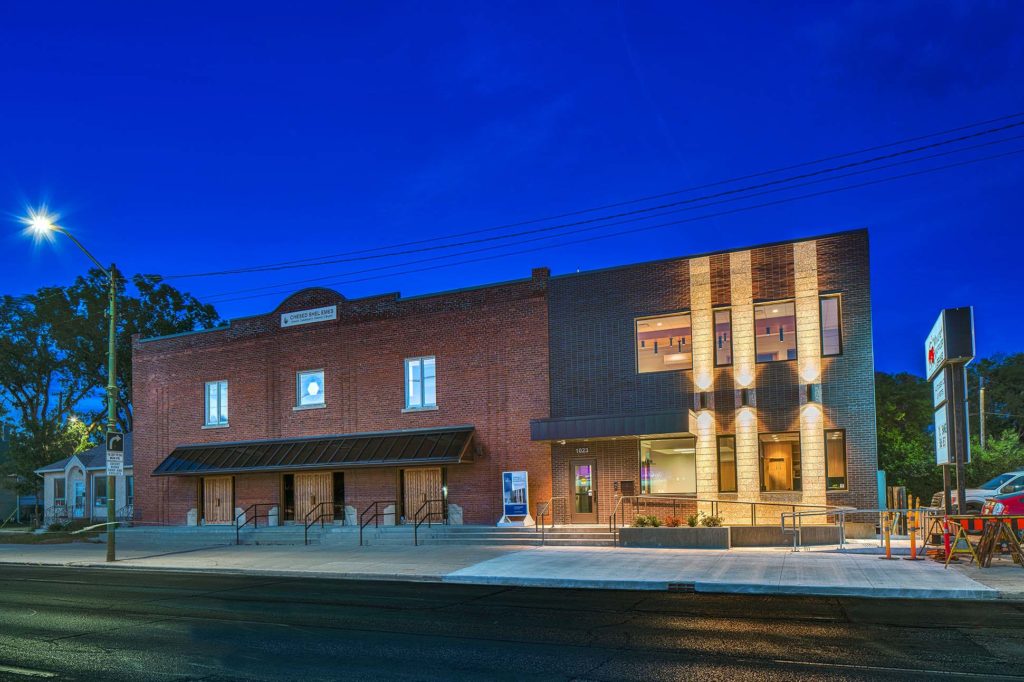Local News
B’nai Brith launches new Canada-wide legal networkto fight antisemitism, human rights abuses
 By MYRON LOVE On Monday, February 22, B’nai Brith Canada introduced its new legal network – the Matas Law Society – to the world with a virtual program – a “fireside chat” – featuring B’nai Birth CEO Michael Mostyn and the eponymous David Matas himself – B’nai Brith Canada’s long time senior legal counsel and one of the world’s best known fighters for human rights.
By MYRON LOVE On Monday, February 22, B’nai Brith Canada introduced its new legal network – the Matas Law Society – to the world with a virtual program – a “fireside chat” – featuring B’nai Birth CEO Michael Mostyn and the eponymous David Matas himself – B’nai Brith Canada’s long time senior legal counsel and one of the world’s best known fighters for human rights.
Matas reported that the event – which attracted almost 500 viewers – provided an overview of the work of B’nai Brith and its Winnipeg-based League for Human Rights which is involved in highlighting war crimes, hate speech, Holocaust denial, anti-Zionism and antisemitism, as well as more general human rights issues.
“We also explained what the Matas Law Society is striving to accomplish,” Matas said. “We received a lot of positive feedback.”
In an earlier interview with The Jewish Post & News, Michael Mostyn noted that the Matas Law Society has been in the planning for about a year. “We have had a lot of discussion with Jewish lawyers across Canada about the need for a Jewish law group to fight against anti-semitism and for human rights,” he said. “There was one such group in Toronto but it disbanded in the 1970s. It was felt at the time that there was no longer a need for such a group.
“But with antisemitism rising, using the law is one way to combat it. We’ve been regularly hearing from legal professionals asking how they can help contribute to fighting antisemitism and standing up for human rights.”
Mostyn added that David Matas is the ideal individual to spearhead such a legal network. “David personifies what the Matas Law Society is about,” Mostyn noted. “We are honoured that he agreed to lead this initiative. His inspiring passion for the law and tireless work in fighting for human rights embodies the spirit of what we hope to achieve with this new law society.”
Matas himself pointed out that antisemitism has been around for a long time and is not going to go away. “Before World War II, antisemitism was acceptable everywhere,” he said. “The Holocaust drove it underground and made it disreputable for a time. But as the Holocaust recedes farther into the past, antisemitism is becoming ever more difficult to suppress.”
Mostyn reported that the new Law Society is being very well received thus far. “We have had over 120 individuals sign on even though we have not done much advertising yet,” he said. “That number includes students from almost every law school in Canada.”
He added that there have even been some American students who have shown interest.
“We have had quite a buzz,” he continued. “And we expect that interest to only grow as we continue to build our program.
“We are seeking accreditation for our educational efforts from law societies across the country.”
Membership in the Matas Law society, he pointed out, offers a whole host of exclusive opportunities that are highly valuable no matter what stage of your legal career you are at. These includ:e Continuing Legal Education (CLE) programming; access to unique networking opportunities with some of this country’s most prominent lawyers and activists; B’nai Brith lodge membership; and, for those inclined, an opportunity to improve the state of human rights in Canada by getting involved with some of the major cases with which B’nai Brith is constantly involved on the national stage. The League for Human Rights regularly intervenes before the courts in highly publicized cases.
Among the cases in which B’nai Birth has been involved are: the issue of the labeling of Israeli wines from Judea and Samaria – which is now before the Federal Court of Appeal; a case at the Ontario Court of Appeal involving the provincial government’s Student Choice Initiative policy, which permits Ontario postsecondary students to opt out of paying incidental fees for non-essential services at their schools (which may include fees towards student unions that support the BDS movement); and a landmark case before the Supreme Court of Canada as to whether the use of humour can be used as a potential defense for the promotion of discrimination. The latter case concerns Mike Ward, a Quebec-based comedian who was sued for extensively mocking a nine-year-old disabled boy during his shows.
Mostyn noted that all levels of involvement in the Matas Law Society are welcome and everything helps — from simply signing up to actively defending the community in court, there is something for everyone. Membership costs $250 per year and is open to all Jewish lawyers, paralegals, and law students. Students currently enrolled in a law program are eligible to join for free.
Local News
Thank you to the community from the Chesed Shel Emes

We’re delighted to share a major milestone in our Capital Campaign, “Building on our Tradition.” Launched in November 2018, this campaign aimed to replace our outdated facility with a modern space tailored to our unique needs. Our new building is designed with ritual at its core, featuring ample preparation space, Shomer space, and storage, creating a warm and welcoming environment for our community during times of need.
We’re grateful to the nearly 1,000 generous donors who contributed over $4 million towards our new facility. A $750,000 mortgage will be retired in November 2025, completing this monumental project in just seven years.
We’re also thrilled to announce that our Chesed Shel Emes Endowment Fund has grown tenfold, from $15,000 to $150,000, thanks to you, the Jewish Foundation of Manitoba’s FundMatch program, and Million Dollar Match initiative in 2024. Our fund helps ensure that everyone can have a dignified Jewish funeral regardless of financial need.
As we look to the future, our goal remains to ensure the Chevra Kadisha continues to serve our community for generations to come. Our focus now shifts to replenishing our savings account and growing our JFM Endowment fund.
We’re deeply grateful for your support over the past several years.
It’s our privilege to serve our community with care and compassion.
With sincere appreciation,
Campaign cabinet: Hillel Kravetsky, Gerry Pritchard, Stuart Pudavick,
Jack Solomon, and Rena Boroditsky
Murray S. Greenfield, President
Local News
Winnipeg Beach Synagogue about to celebrate 75th anniversary

By BERNIE BELLAN (July 13) In 1950 a group of cottage owners at Winnipeg Beach took it upon themselves to relocate a one-room schoolhouse that was in the Beausejour area to Winnipeg Beach where it became the beach synagogue at the corner of Hazel and Grove.
There it stayed until 1998 when it was moved to its current location at Camp Massad.
On August 2nd members of the synagogue will be holding a 75th anniversary celebration.

As part of the celebration anyone who is a descendant or relative of any of the original members of the first executive committee (as seen in the photo here) is invited to attend the synagogue that morning.
If you are a relative please contact Abe Borzykowski at wpgbeachshule@shaw.ca or aborzykowski@shaw.ca to let Abe know you might be attending or for more information about the 75th anniversary celebration.
We will soon be publishing a story about the history of the beach synagogue, which is something I’ve been writing about for over 25 years.
Local News
Vickar Family cuts ribbon on new Tova Vickar and Family Childcare Centre

By MYRON LOVE In the words of Larry Vickar, the Shaarey Zedek’s successful Dor V’ Dor Campaign “is not only a renewal of the synagogue but truly a renewal movement of Jewish life in our community.”An integral part of that renewal movement was the creation of a daycare centre within the expanded synagogue. On Monday, June 23, Larry and Tova Vickar cut the ribbon, thereby officially opening the Tova Vickar and Family Childcare Centre in the presence of 100 of their family members, friends and other supporters of the project.
The short program preceding the morning ribbon-cutting began with a continental breakfast followed by a welcome by both Fanny Levy, Shaarey Zedek’s Board President, and Executive Director Dr. Rena Secter Elbaze. In Elbaze’s remarks, she noted that Larry and Tova wanted their family (including son Stephen and family, who flew in from Florida) and friends at the event to celebrate the opening of the Tova Vickar and Family Childcare Centre, “not because of the accolades, but because, as Larry put it, he hopes that their investment in the congregation will inspire others to do the same.”
“When Larry and I spoke about what this gift meant to him and the message he wanted people to take away,” she continued, “I couldn’t help but connect it to the teachings of Reb Zalman Schachter-Shalomi whose book – Age-ing to Sage-ing – changes the whole way we look at the concept of ageing and basing it on our ancestral teachings.”
She explained that his concept of “Sage-ing” is based on three key ideas – Discover your meaning and purpose; accept our mortality and think about the legacy you want to leave.
“Larry spoke about these exact concepts when we met,” she said.
Elbaze also noted the presence of Shaarey Zedek’s newly-arrived senior Rabbi Carnie Rose, former Rabbi Alan Green, and area MLAs Mike Moroz and Carla Compton.
Larry Vickar expressed his great appreciation for all those in attendance. “Tova and I are deeply moved to stand here with you today for this important milestone in our community”, he said. “We are grateful to be surrounded by all of you, the people we care about, our family and friends… you who have touched our lives and played some part in our journey.”
